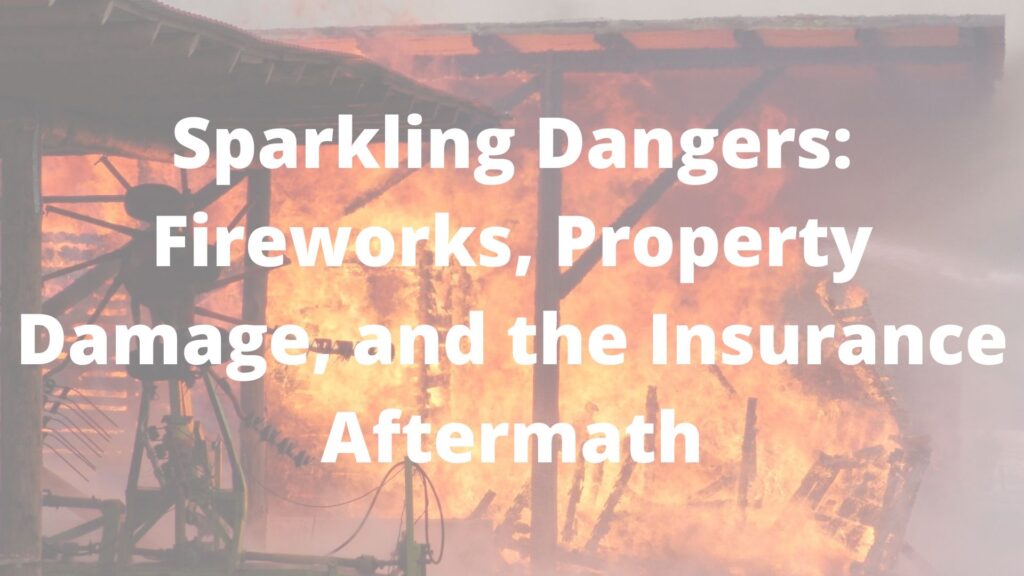
The vibrant bursts and dazzling displays of fireworks are a quintessential part of many celebrations, but behind the spectacle lies a serious risk of property damage and personal injury. While fireworks are intended to bring joy, they can quickly turn into a nightmare, leading to devastating fires and costly insurance claims. Understanding the potential dangers and taking necessary precautions is crucial to ensuring a safe and enjoyable experience.
One of the most significant risks associated with fireworks is property fires. Embers and stray sparks can easily ignite dry grass, foliage, rooftops, and other flammable materials. According to the U.S. Fire Administration (USFA), fireworks start an average of 19,500 fires per year, including 1,600 structure fires and 200 vehicle fires. These fires result in significant property damage, often requiring extensive repairs or even complete rebuilding. In areas prone to dry conditions, like parts of Florida, the risk is amplified, making fireworks safety even more critical. Florida, like many states, has specific laws regarding the sale and use of fireworks. While some novelty fireworks are legal, larger, more powerful displays often require permits and professional handling. New York also enforces strict regulations, with many consumer fireworks being illegal and requiring permits for professional displays. Both states, based on USFA guidelines, emphasize the importance of having a water source nearby, keeping a safe distance, and never allowing children to handle fireworks.
Liability insurance plays a crucial role in mitigating the financial impact of fireworks-related accidents. If a firework you set off causes damage to a neighbor’s property or injures someone, you could be held liable for the resulting costs. Homeowners insurance typically includes liability coverage, which can help pay for these expenses. However, it’s essential to review your policy to understand the coverage limits and any exclusions that may apply. In some cases, if negligence is proven, insurance companies may deny coverage. It’s also important to note that illegal fireworks use can invalidate insurance claims. Renters insurance also provides liability coverage, which can be invaluable in these situations.
Beyond property damage, fireworks can cause severe injuries, including burns, eye injuries, and even amputations. The USFA reports thousands of injuries each year related to fireworks. These injuries can lead to significant medical expenses and long-term consequences. Therefore, prevention is paramount. Always handle fireworks with care, follow the instructions provided, and never attempt to relight malfunctioning fireworks. Children should never be allowed to handle fireworks, and even sparklers, which are often considered safe, can reach extremely high temperatures and cause serious burns.
To minimize the risk of fire and injury, consider attending professional fireworks displays instead of using consumer fireworks. These displays are conducted by trained professionals who take extensive safety precautions. If you choose to use consumer fireworks, purchase them from reputable vendors and follow all local laws and regulations. Keep a bucket of water or a garden hose nearby to extinguish any stray sparks or malfunctioning fireworks. Never use fireworks under the influence of alcohol or drugs. After the display, soak used fireworks in water before disposing of them to prevent any lingering embers from igniting.
Ultimately, enjoying fireworks safely requires a combination of common sense, adherence to safety guidelines, and understanding the potential consequences. By taking these precautions and being aware of the risks, you can help ensure that your celebrations remain safe and enjoyable, avoiding the devastating consequences of fireworks-related accidents and the headaches of insurance claims. Remember, a moment of carelessness can lead to a lifetime of regret.
 John Caravella Esq., is a construction attorney and formerly practicing project architect at The Law Office of John Caravella, P.C., representing architects, engineers, contractors, subcontractors, and owners in all phases of contract preparation, litigation, and arbitration across New York and Florida. He also serves as an arbitrator to the American Arbitration Association Construction Industry Panel. Mr. Caravella can be reached by email: [email protected] or (631) 608-1346.
John Caravella Esq., is a construction attorney and formerly practicing project architect at The Law Office of John Caravella, P.C., representing architects, engineers, contractors, subcontractors, and owners in all phases of contract preparation, litigation, and arbitration across New York and Florida. He also serves as an arbitrator to the American Arbitration Association Construction Industry Panel. Mr. Caravella can be reached by email: [email protected] or (631) 608-1346.
The information provided on this website does not, and is not intended to, constitute legal advice; instead, all information, content, and materials available on this site are for general informational purposes only. Readers of this website should contact their attorney to obtain advice with respect to any particular legal matter. No reader, user, or browser of this site should act or refrain from acting on the basis of information on this site without first seeking legal advice from counsel in the relevant jurisdiction. Only your individual attorney can provide assurances that the information contained herein – and your interpretation of it – is applicable or appropriate to your particular situation. Use of, and access to, this website or any of the links or resources contained within the site do not create an attorney-client relationship between the reader, user, or browser and website authors, contributors, contributing law firms, or committee members and their respective employers.
